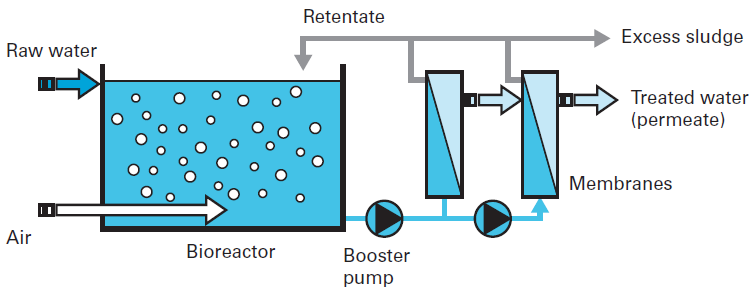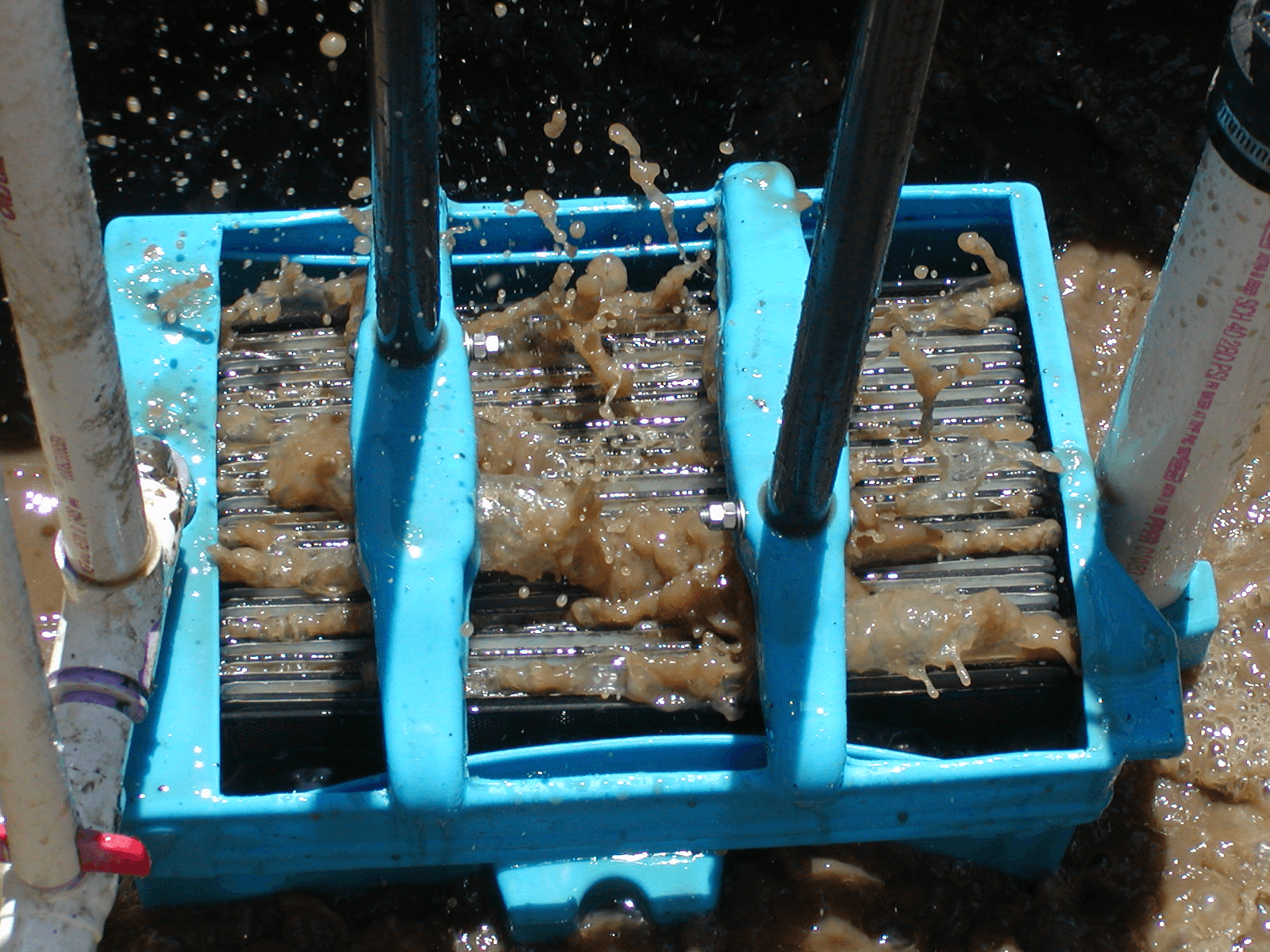The Economic Benefits of Installing a Membrane Bioreactor for Your Facility
Wiki Article
How Membrane Layer Bioreactors Are Reinventing Water Purification Equipments
The development of membrane layer bioreactors (MBRs) represents a significant improvement in the field of water filtration, merging organic treatment procedures with cutting-edge membrane layer filtration technologies. This assimilation not only improves the quality of dealt with effluent but likewise addresses urban area constraints, making MBRs especially ideal for densely booming areas. As worldwide water shortage heightens, the function of MBRs in promoting drinkable water reuse and lasting water management ends up being significantly crucial. The ramifications of this innovation expand beyond efficiency-- what difficulties and possibilities lie ahead for its extensive application?Summary of Membrane Bioreactors
Membrane bioreactors (MBRs) represent a significant advancement in water filtration modern technology, as they incorporate organic therapy processes with membrane filtration. This assimilation boosts the performance of wastewater treatment by utilizing microorganisms to degrade natural pollutants while simultaneously using semi-permeable membrane layers to different treated water from put on hold microorganisms and solids.The MBR system usually includes an organic activator where the microbial population metabolizes contaminants, adhered to by a membrane purification unit that keeps biomass and enables only tidy water to go through. This dual capability leads to higher effluent top quality compared to conventional therapy methods. MBRs can be operated in both batch and continual flow settings, using flexibility in layout and application.
They likewise make it possible for the recovery of water for reuse, therefore adding to water sustainability initiatives. In general, MBRs are at the center of boosting water treatment effectiveness and top quality, showcasing the possibility for innovative services in ecological monitoring.
Benefits of MBR Technology
The combination of biological therapy with membrane layer purification offers various advantages for water purification procedures. Among the key advantages of Membrane layer Bioreactor (MBR) technology is its ability to efficiently eliminate both natural and not natural impurities, bring about high-quality effluent. The membranes act as a physical barrier, avoiding suspended solids and microorganisms from going through, which boosts the overall safety and security and reliability of cured water.Additionally, MBR systems need a smaller sized footprint contrasted to conventional therapy approaches, enabling for more effective space use. This portable design is especially useful in city settings where land is restricted. MBRs additionally show functional versatility, accommodating varying influent top qualities and circulation rates without significant efficiency destruction.
Moreover, the process offers boosted nutrient elimination abilities, particularly for nitrogen and phosphorus, which are critical for protecting against eutrophication in obtaining waters. The decreased sludge production connected with MBR innovation also converts to reduce disposal costs, making it a cost-effective remedy in the lengthy run - Membrane Bioreactor. Overall, the benefits of MBR innovation position it as a leading option for sustainable and cutting-edge water purification systems, resolving both environmental and financial worries
Applications in Water Purification
Applications of Membrane Bioreactor (MBR) modern technology in water filtration are impactful and varied, addressing numerous treatment requires throughout several fields. MBRs efficiently incorporate biological therapy processes with membrane purification, making them perfect for metropolitan wastewater treatment, commercial effluent monitoring, and even drinkable water reuse initiatives.In metropolitan settings, MBRs are increasingly used to enhance the top quality of treated wastewater, allowing for compliance with strict discharge laws and helping with the recycling of water for watering and non-potable usages. Their portable style additionally makes them appropriate for metropolitan settings where room is restricted.
Industrially, MBR technology is utilized to treat process water and wastewater, particularly in industries such as food and beverage, pharmaceuticals, and textiles. By successfully eliminating pollutants and put on hold solids, MBRs assist markets lessen ecological effects while recuperating useful sources from wastewater streams.
Additionally, MBRs are getting traction in decentralized water treatment applications, where small-scale systems can be deployed in remote locations or creating areas. This versatility allows neighborhoods to achieve sustainable water monitoring remedies, boosting accessibility to clean water while decreasing reliance on traditional therapy techniques.
Study and Success Stories

In another instance, a fabric manufacturing center in Bangladesh took on MBR innovation to address its wastewater obstacles. The system minimized chemical oxygen demand (COD) degrees from 1,200 mg/L to much less than 100 mg/L, thus fulfilling regulative standards and significantly decreasing environmental impact.
The College of Cape Community's MBR setup has proven effective in treating greywater for non-potable reuse on school. This job not just saves drinkable water yet also acts as an academic model for sustainable techniques.
Moreover, a fish and shellfish processing plant in Norway utilized MBR innovation to treat effluents consisting of high levels of raw material, accomplishing over 90% toxin removal. These instance studies highlight MBR technology's adaptability and its vital function in boosting water quality throughout varied applications.
Future of Water Treatment Solutions
As worldwide water deficiency and pollution obstacles magnify, ingenious water therapy solutions are ending up being significantly necessary to make sure lasting access look at more info to clean water. The future of water therapy depends on the assimilation of advanced innovations that boost the performance and effectiveness of purification procedures. Membrane layer bioreactors (MBRs) go to the center of this evolution, combining biological therapy with membrane layer purification to generate top quality effluent appropriate for different applications.
Emerging trends such as resource recovery from wastewater, including nutrients and energy, will further transform therapy centers right into green centers. In addition, advancements in nanotechnology and membrane layer products assure boosted efficiency and durability of filtering systems.

Verdict
Their function in safe click over here and clean water reuse and sustainable water administration highlights their importance in attending to international water shortage obstacles. Continued research study and growth will additionally boost the efficacy and fostering of MBR modern technology, guaranteeing a durable future for water therapy solutions.The introduction of membrane layer bioreactors (MBRs) represents a considerable improvement in the area of water purification, merging biological therapy procedures with cutting-edge membrane filtering modern technologies. As international water scarcity heightens, the duty of MBRs in promoting potable water reuse and sustainable water administration ends up being progressively essential. They also enable the recovery of water for reuse, therefore contributing to water sustainability efforts.As worldwide water shortage and air pollution obstacles escalate, innovative water therapy solutions are becoming increasingly important to guarantee sustainable access to clean water. Their duty in safe and clean water reuse and lasting water monitoring highlights their relevance in resolving international water shortage difficulties.
Report this wiki page